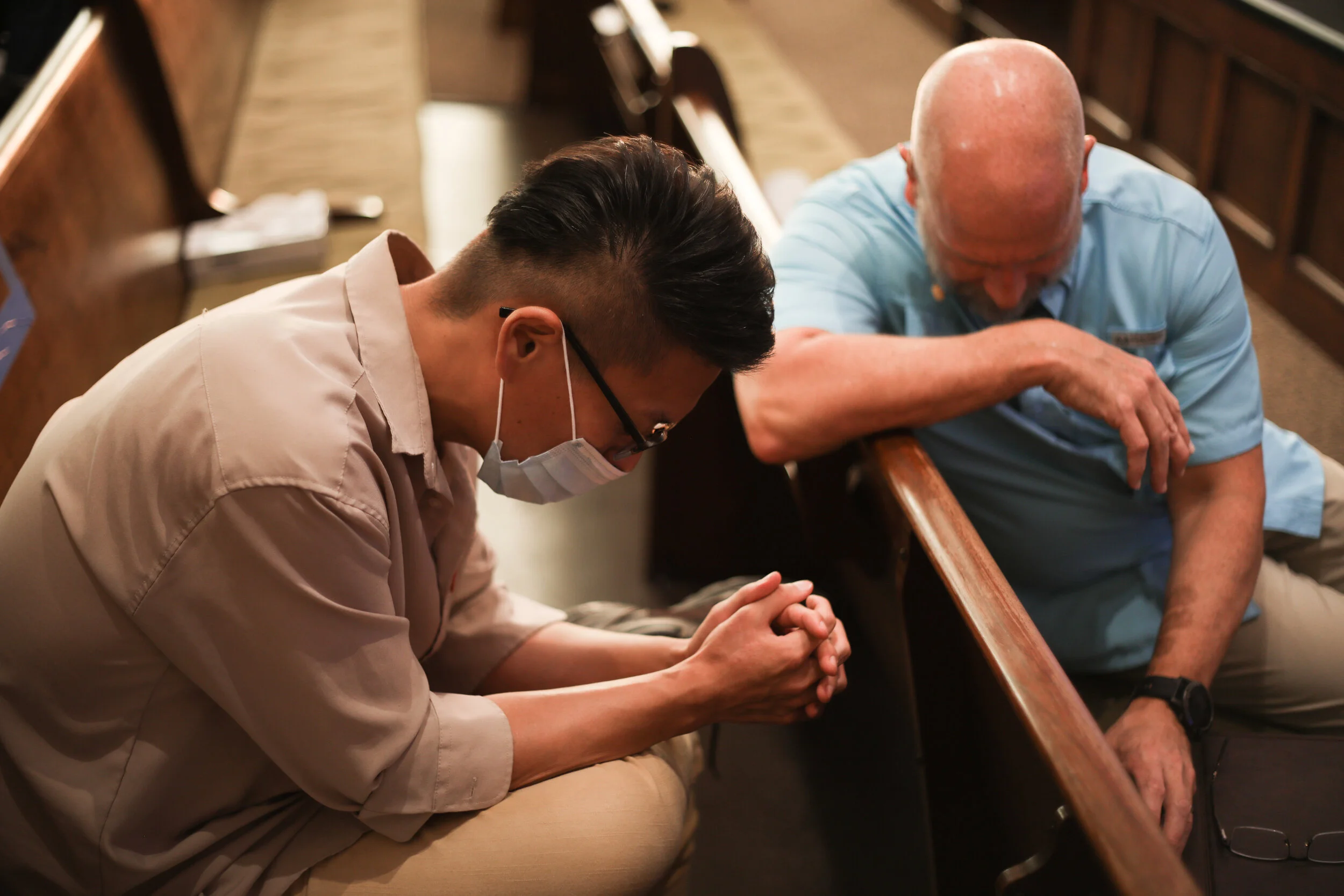Counseling in Discipleship
Good afternoon,
Over the years, it has become abundantly clear that counseling is very much a part of the discipleship experience. Even with an A+ disciple, there will be moments in the discipleship journey where the discipler must function as a counselor. This is counseling that is corrective or inquisitive in nature. Counseling that is corrective in nature involves addressing issues associated with carnality whereas counseling that is inquisitive in nature deals with inquiries where the disciple is seeking direction from the discipler.
Early on, I found it very sobering that counseling scenarios were landing on my desk instead of the pastor’s! As comforting as it would have been for me to have them go the pastor at the time, I realized that as the teacher in the discipleship relationship, I had to trust God for wisdom in the moment to properly minister to the disciple. This has led me to establish 7 core principles to abide by when dealing with counseling scenarios in discipleship:
Principle #1: Accept
2 Cor. 3:4 And such trust have we through Christ to God-ward: 5 Not that we are sufficient of ourselves to think any thing as of ourselves; but our sufficiency is of God;
I must accept that in and of myself, I am insufficient. This means that whatever the counseling issue is, it is beyond the scope of my ability. My insufficiency in the flesh says that I am incapable of solving anyone’s problem or changing anyone. The good news is, IT’S NOT MY RESPONSIBILITY!
As I look back, counseling scenarios of any kind that went poorly, did so because somewhere in my warped thinking, I thought I could solve someone’s problem or change them. By accepting my insufficiency in the flesh, I never enter a counseling scenario feeling pressure to fix anything.
Principle #2: Ask
Jas 1:5 If any of you lack wisdom, let him ask of God, that giveth to all men liberally, and upbraideth not; and it shall be given him.
If I am insufficient in and of myself, I’m surely lacking in wisdom. So, at the moment I realize that a counseling scenario is impending in discipleship, earnestly from the heart, I’m asking God for wisdom that is from above (Jas 3:17). This enables me to see the issue(s) from God’s perspective and not my own. Being wise in my own eyes is detrimental enough to me, how much more so in a counseling scenario?
Principle #3: Attend
Mat 13:9 Who hath ears to hear, let him hear.
People who are tuned in to truth (John 17:17), hear things that others do not. It is very important to attend (pay attention to) to what the disciple is saying as well as what they might not be saying. The Lord continues to teach me that “listening” in counseling is as important as “talking.” In attending to what is being said, I find that I am preoccupied with trying to answer a few key questions in my mind:
• “What is the actual problem?”
It is very easy for the disciple to mistake the symptoms for the problem. Addressing symptoms only provide temporary solutions.
• “Is there a perspective they might be missing?”
A blind spot calls for an outside perspective. This could be preventing them from viewing something correctly in the situation. If so, this helps us to introduce a critical perspective later.
• “Is there something they aren’t telling me?”
Intentionally or unintentionally, sometimes, I’ve sensed there’s more to the story. The math isn’t adding up as we say, or things just don’t seem to be lining up.
• “What is their heart-attitude?”
If their desire is set to pleasing the Lord, it will be evident in how the issue is presented. If not, God will make it clear that they are not interested in what pleases Him. This dictates how I answer.
Principle #4: Answer
Jesus often addressed questions or issues by asking questions. Additionally, He never asked questions to get answers, He asked questions to give answers. Questions have a way of bringing people face-to-face with themselves or providing them with a perspective they would otherwise not get. While attending to what’s being said, I begin building what I believe are crucial questions for them to consider and for me to discuss with them. After summarizing what I believe what has been communicated, some questions that I’ve asked in the past are:
• “What do you believe God’s Word says about this?”
Typically, in corrective counseling scenarios, the issue is not what’s right. The issue is, they need to acknowledge it. This is important because they must agree with God regarding what’s right if they are going to successfully work through whatever the issue is.
• “Given the history, why did you feel it was ok to reach out to or agree to have coffee with your ex-girlfriend?”
If we flee fornication, the opportunity to fornicate will not be an option. When they agreed to meet their ex-girlfriend for coffee, fornication became an option at that moment. As much as the sin of fornication is an issue, we must establish the importance of fleeing.
• “You mentioned being discouraged to the point where you’ve stopped praying and reading God’s Word. How has that helped you? Did you stop praying and reading God’s Word to express your disappointment with God? If God’s way is perfect (Psa. 18:30) and there is no unrighteousness in Him (Psa. 92:15), where’s the problem?”
I know the answers to these questions. The point is getting them to accept responsibility for where they are because any time someone tries to blame God for what’s wrong in their life, it is because they do not want to accept responsibility for what they’re doing or have done.
• “Sounds like your wife became very angry with you and said some very hurtful things. As you consider the incident objectively, did you say or do something hurtful to provoke that reaction from her?”
Whenever there is conflict between two people, everyone must look at themselves and consider if they had any ownership in the conflict (especially in marriage). I’ve been blindsided in marriage counseling as once I had both spouses in the room together, “the rest of the story came to light.”
• “As you consider taking this lucrative job offer in Chicago, given that you haven’t finished Discipleship 1, D2 and LFBI, how would that reconcile with you strongly believing at one point that God has you in Kansas City to get discipled and equipped for the work of the ministry?
As much as I believe it is right for them to stay and continue in the discipleship process, I CAN’T MAKE THEM. What I’m looking to do here through this question and discussion is help them clearly see the difference between God sending them to Chicago versus them moving to Chicago. Those are diametrically opposed of one another. And if they moved to Chicago and fall flat on their face, they’ll know why.
Principle #5: Agree
Amo 3:3 Can two walk together, except they be agreed?
It is imperative for the disciple to understand their need to walk with God. However, they cannot walk with God except they be agreed with Him. Based on our discussion up to this point, I am asking the disciple what they believe God would have them to do? The question usually goes something like this:
“Based on what we’ve seen together in God’s Word, what are you going to do?”
This question is intentionally direct and extremely important because they must take ownership of their obedience if they are going to move forward.
Principle #6: Appeal
1 John 5:14 And this is the confidence that we have in him, that, if we ask any thing according to his will, he heareth us: 15 And if we know that he hear us, whatsoever we ask, we know that we have the petitions that we desired of him.
The flesh is weak. Therefore, I will reinforce that as sincere as they might be in the moment, that sincerity will be challenged later. Together, the disciple and I are going to call on God for help to follow-through on what He has made clear to the disciple.
Principle #7: Accountability
Pro 27:17 Iron sharpeneth iron; so a man sharpeneth the countenance of his friend.
I want the disciple to understand that this is not the end of discussion regarding this issue. They should understand that I will continue praying for them and will be following up with respect to how they are moving forward in what God has made clear or what they are trusting Him to make clear.
In closing, I’ve learned it is not the best practice for me to have the disciple take 5-10 minutes to present an issue and then listen to me preach to them about it for 40 minutes. I must do all that I can to get critical information to properly help them address the problem. To get that information requires that I attend to what they’re saying and wisely answer, which allows me to have a dialogue with them that is invaluable for both of us. Ultimately, my goal is to see the Lord bring them to the place where they know precisely what would be pleasing in His sight.
Kenny

